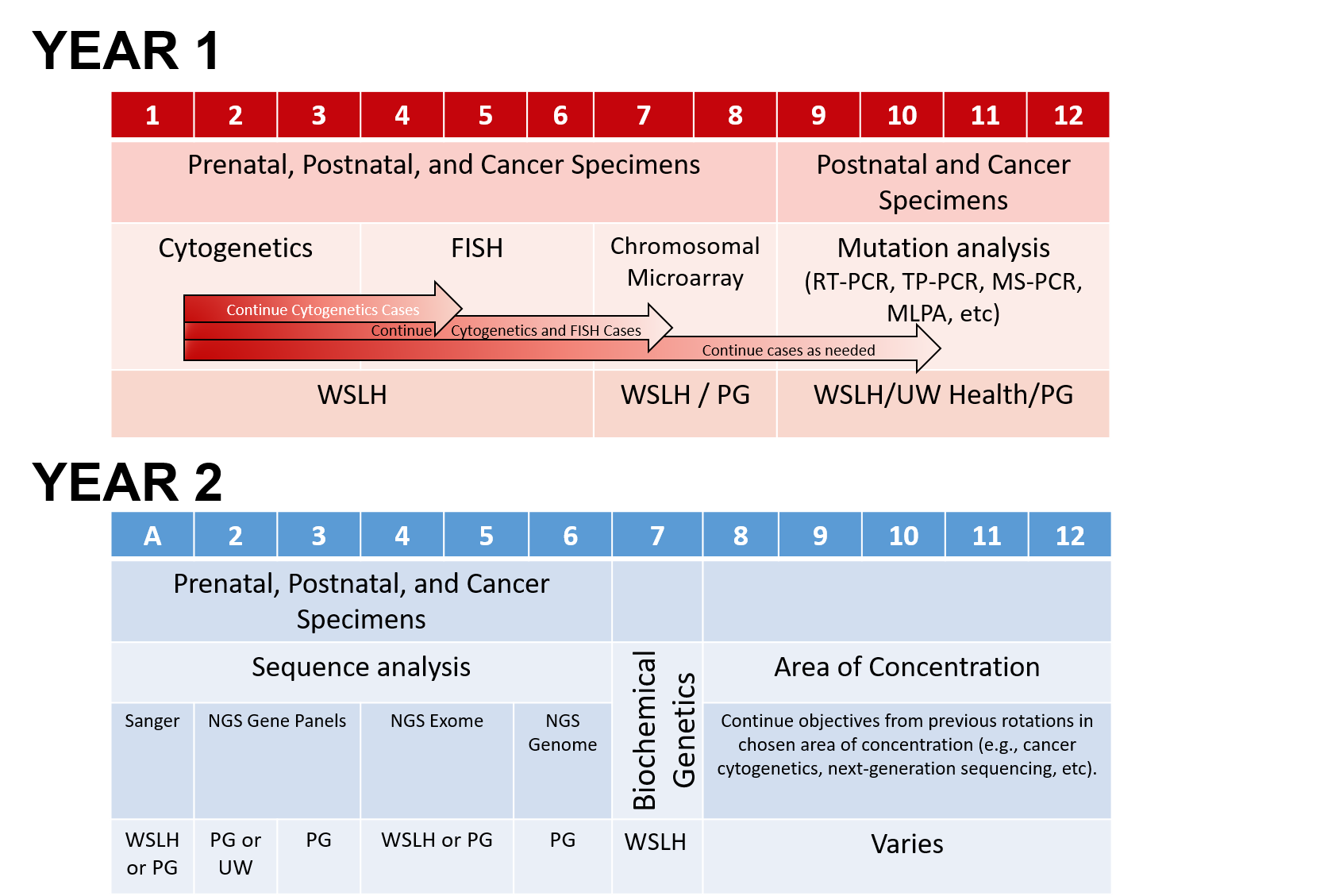Education and Outreach
For Genetics Professionals and Trainees
Cytogenetics Basics – Nomenclature and definitions
Cancer Cytogenetics– Examples of chromosome abnormalities involved in leukemia and neoplasias
Constitutional Cytogenetics
FISH Analysis – Examples of the different types of FISH probe designs
Karyotyper – An interactive software tool designed to train users to identify chromosomes
Regularly scheduled education series
Collaborative Genomics Core Monthly Case Conference
Fellowship Training Programs
- Laboratory Genetics and Genomics (LGG) Fellowship
The LGG training program is a two year training offered through the Wisconsin State Laboratory of Hygiene (WSLH), in partnership with PreventionGenetics, Inc., and in collaboration with UW Health, the Waisman Center, and the Department of Pediatrics. This unique relationship with our partner labs provides fellows with a diverse and well-rounded experience in all aspects of clinical cytogenetic and molecular genetic and genomic testing. This program includes formal didactic work, clinical experience, research, teaching opportunities, as well as extensive laboratory training with progressive responsibility throughout the tenure of the fellowship. Fellows will leave the program prepared to direct and interpret clinical genetic analyses relevant to the diagnosis and management of human genetic diseases at the highest level of quality.
WSLH Laboratory Genetics and Genomics Fellowship Virtual Tour
LGG Fellowship Training Schedule
UW Department of Pediatrics information on the fellowship programs
- Clinical Biochemical Genetics (CBG) Fellowship
The CBG training program is offered in partnership between the Wisconsin State Laboratory of Hygiene (WSLH) and the Department of Pediatrics, Division of Medical Genetics. This training program is designed to teach skills necessary to direct operations of an accredited biochemical genetics laboratory as well as conduct academic research as related to clinical laboratory testing. This program is offered in collaboration with the Wisconsin Newborn Screening Laboratory. This unique relationship is intended to provide a comprehensive learning environment, exposing training fellows to the field of biochemical genetics and its interface with newborn screening. Additional information regarding testing in the biochemical genetics and newborn screening laboratories can be found here.
For Non-Genetics Clinical Providers
Genetics in Wisconsin – an online resource for non-genetic providers – Genetics in Wisconsin provides information regarding indications for referral to genetics, elements of a genetics evaluation including commonly recommended genetic tests, informed consent videos, practice guidelines for genetic conditions, Ask an Expert feature (not a consultation service) and more.
For Elementary, Middle and High School Educators
- School presentations: please contact our laboratory if you are interested in having lab staff visit a K-12 classroom to discuss careers in genetics or to participate in another education outreach event.
- Wisconsin Alumni Research Foundation (WARF) events
- Grandparent’s University
Karyotyper
Karyotyper is an interactive software tool designed to train users to identify chromosomes and to begin learning the skills of cytogenetic analysis. A series of chromosome matching modules are included featuring half karyotypes, full karyotypes, and intact metaphase spreads. Initially, the user is alerted to incorrectly placed chromosomes, but the feedback becomes less immediate in more advanced modules. Karyotyper was created by an experienced cytotechnologist and can be utilized by learners at every level – from grade school students to new professionals. Click the icon above or link here. Give it a try!
Collaborative Genomics Core
Case Conference and Molecular Tumor Board
A recurring scheduled series for CME credit via the UW Office of Continuing Professional Development (OCPD)
Global Objective- Upon completion of the activity, participants will have the ability to recognize both common and rare genetic abnormalities associated with developmental delay, infertility, prenatal ultrasound findings and oncology specimens. This activity also provides a consult opportunity for review by a molecular tumor board overseen by the UW Comprehensive Cancer Center.
(Institutional use only)
